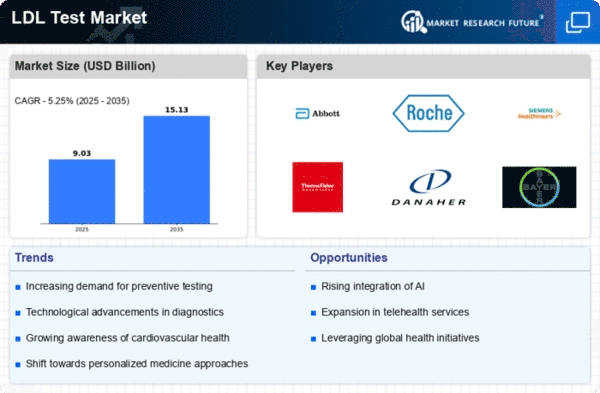Market Trends
Key Emerging Trends in the LDL Test Market
The LDL test market has been witnessing notable trends and developments in recent years, reflecting changes in healthcare practices, advancements in technology, and evolving patient needs. One significant trend is the increasing awareness and emphasis on preventive healthcare measures, particularly in the management of cardiovascular diseases (CVDs). Given the critical role of low-density lipoprotein (LDL) cholesterol in the development of atherosclerosis and coronary artery disease, healthcare providers are placing greater importance on routine LDL testing as part of comprehensive cardiovascular risk assessment protocols. This trend is driving the demand for LDL testing services and products, contributing to market growth.
Furthermore, there is a growing preference for point-of-care (POC) testing solutions in the LDL test market, driven by the need for rapid and convenient diagnostic tools in clinical settings. POC LDL tests offer advantages such as quick turnaround times, minimal sample volume requirements, and ease of use, making them particularly suitable for primary care clinics, emergency departments, and outpatient settings. The availability of portable POC devices and handheld analyzers further enhances accessibility to LDL testing, enabling timely risk assessment and treatment decisions for patients at the point of care.
Additionally, the LDL test market is witnessing technological advancements and innovations aimed at improving the accuracy, reliability, and convenience of LDL cholesterol measurement. Novel assay platforms utilizing advanced detection techniques such as immunoassays, enzymatic methods, and spectroscopy offer enhanced sensitivity and specificity compared to conventional methods. Moreover, the integration of automated sample processing, data management, and connectivity features streamlines workflow efficiency and reduces the potential for errors in LDL testing procedures. These technological advancements drive market competitiveness and spur the adoption of next-generation LDL testing solutions by healthcare providers and laboratories.
Moreover, there is a trend towards personalized medicine approaches in the management of dyslipidemia and CVD risk, driving demand for specialized LDL testing services and tailored treatment strategies. With growing recognition of the heterogeneity of patient populations and the need for individualized risk assessment, there is increasing emphasis on comprehensive lipid profiling and genetic testing to identify genetic variants associated with familial hypercholesterolemia (FH) and other lipid disorders. This trend underscores the importance of accurate LDL testing in guiding personalized treatment decisions and optimizing cardiovascular outcomes for high-risk patients.
Furthermore, the LDL test market is witnessing expansion opportunities in emerging markets and developing regions, driven by rising prevalence of CVDs, increasing healthcare expenditure, and growing awareness of preventive healthcare measures. Governments, healthcare providers, and industry stakeholders are collaborating to enhance access to diagnostic services and implement screening programs for early detection and management of dyslipidemia and related conditions. This trend presents opportunities for market players to expand their presence in untapped regions, introduce affordable testing solutions, and address unmet healthcare needs in underserved communities.


















Leave a Comment